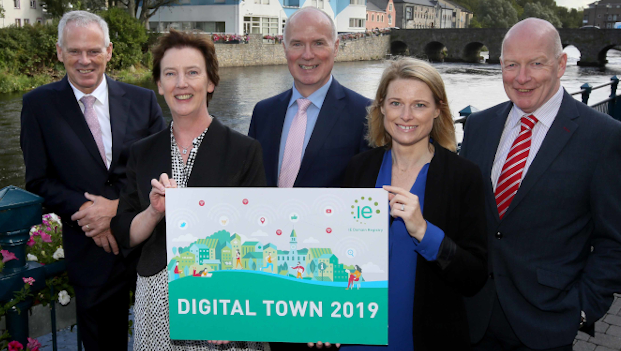
Ireland’s Digital Town 2019: Sligo commended for digitisation efforts
Sligo has been named Ireland’s Digital Town 2019 to mark its achievements in digitisation. Pioneered by IE Domain Registry, the initiative aims to highlight the benefits that the internet brings to towns and to ensure SMEs and local economies are realising the full potential of digital technology.
A celebratory event took place this morning, October 14 at The Model Gallery, Rathquarter, Sligo. Speaking at the event, David Curtin, CEO, IE Domain Registry called Sligo the ‘digital powerhouse’ of the West of Ireland.
Over the years, Sligo has established itself as a hub for digital technology. It has attracted €225 million in investment across a range of areas including; the establishment of North West Tech Cluster; the development of 5G capable infrastructure; its innovation and education supports for SMEs at IT Sligo; and the creation of digital spaces, such as The Building Block and The Landing Space.
Curtin said the Irish towns that invest in digital infrastructure enjoy ‘more revenue’, ‘more jobs’, and ‘better access to public and private services.’
Several highly specialised tech companies including Overstock, LiveTiles and Abtran have been attracted to the area in recent years, creating hundreds of jobs.
Sligo has been commended for its many digital programmes and spaces. Its digital capabilities have connected the town to Ireland’s growing network of regional digital hubs, such as Skibbereen’s Ludgate Hub.
“Sligo has invested in its digital infrastructure to great effect,” said Curtin. “To take just one example, the Building Block co-working space acts like a magnet for Irish and international companies and provides a space for remote workers who would otherwise have to commute to another town or city.
“With continued commitment to these initiatives and programmes, Sligo will continue to be a digital powerhouse for the West of Ireland, contributing economically and socially to its development.”
“Digital technology is empowering,” he said. “For local businesses, it can help them generate more revenue, streamline their operations, and connect to new markets. For the local community, it can mean better access to public and private services, less isolation for people who live in remote locations, more opportunities for education, and more jobs.”
Ciarán Hayes, head of Sligo County Council said that receiving this accolade “cements our commitment to digital transformation and providing top-class facilities for businesses and citizens.”
While Sligo is pushing ahead, Connacht as a whole is experiencing challenges. According to IE Domain Registry’s upcoming Digital Health Index report, 39% of Connacht-Ulster SMEs rate their internet connection as average, poor, or very poor. Just under two-thirds are not confident that the government can deliver the National Broadband Plan in its current form.
Yet, Phil Prentice, chief officer of the Scotland’s Towns Partnership said that towns that lack state-of-the-art digital infrastructure should maximise use of any existing assets: “While it’s always preferable to have high-speed broadband, a town can digitalise what it has. That often starts with addressing the ‘understanding’ gap.
“Businesses and citizens frequently fail to grasp how their lives can be simplified or made more efficient or cost-effective by using digital technology. They harbour misconceptions and can overstate what’s required to ‘become’ digital.”
Curtin said: “IE Domain Registry reports have shown that the vast majority of SMEs don’t do more online because of concerns about investments of time, money, and skills.
“But the reality is different now. Access to digital technology has been vastly improved over the last decade; it’s easier, faster and more affordable than ever before to get online, communicate with customers, and start selling products and services.
“Waiting for the National Broadband Plan to create or implement the perfect digitalisation strategy is the wrong approach. Irish towns should instead focus on bridging the understanding gap: help local businesses and community organisations understand and use digital technologies by focusing investment in skills training and education programmes. That way, they will see a much quicker social and economic returns on their investment.”
TechCentral Reporters







Subscribers 0
Fans 0
Followers 0
Followers